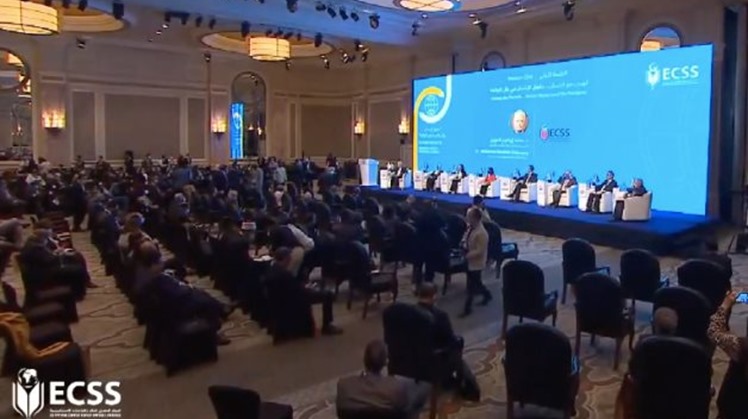CAIRO, 8 April 2020: The Egyptian Center for Strategic Studies (ECSS) recommended on Thursday to emphasize the right to digital transformation and the need to bridge knowledge gaps.
The ECSS held a conference on Thursday titled 'Building a Post-Pandemic World...A Comprehensive Approach to Human Rights.”
The conference was attended by high-profile ministers, officials and representatives of UN organizations. Participating in the conference are civil society organizations working in the field of development that will present their successful experiences since the outbreak last year.
Concluding the conference, the ECSS in a closing statement invited regional offices of international organizations in Egypt to set up a more comprehensive and dynamic cooperative framework.
The ECSS urged expanding the scope of the political field by inviting youth to join political parties and practice partisan work to develop their political capabilities and enable them to assume leadership positions.
This should provide a permanent channel for communication, cooperation and joint work with the ECSS.
It also launched a research program on local and international human rights files.
The ECSS called for renewing the role of the Presidential Pardon Committee while working to develop its work mechanisms in line with recent developments.
This is “in view of the positive role played by the [committee,] which was established based on a youth proposal presented during the first National Youth Conference 2016.
“Based on the reference by some of the attendees to specific issues, such as pretrial detention and the condemnation of some activities, the ECSS recommends that the legislative and judicial authorities concerned review the periods of pretrial detention, and work to find mechanisms to avoid lengthy detentions within the framework of a comprehensive plan to develop legislation and laws in response to developments and challenges, especially as a new world is being shaped by more advanced concepts and requires more flexible responses,” the statement read.
*The conference also concluded a number of recommendations:
- The pandemic has revealed the need to put in place “early warning” mechanisms. The World Health Organization (WHO) designated the coronavirus as a pandemic on 11 March 2020, that is nearly four months after its appearance. A long time was lost that could have contributed to saving people’s lives and curbing its spread.
- The coronavirus crisis has urged the necessity of expanding the authority of the WHO, in a manner similar to that of the UN Security Council which is empowered to maintain international peace and security, based on its role in protecting human health. The role of the WHO should be expanded to ring alarm bells, motivate countries to cooperate and share experiences accurately, and encourage the global medical and scientific community to confront the pandemic.
- Emphasizing the need to confront all forms of inequality related to the right to health, foremost among which is fair access to vaccines and various types of treatment.
- The need to provide all forms of support and protection for women against threats to their health.
- Establishing additional protection and care programs for children in poor and marginalized areas to ensure their growth in an appropriate environment.
- The provision of additional support to refugees and migrants during catastrophes, especially healthcare crises.
- The need to consider adopting more flexible, inclusive, and dynamic educational systems to avoid disruptions in times of crises.
- Emphasizing the right to digital transformation and the need to bridge knowledge gaps.
- Mobilizing resources regionally and internationally to stimulate sustainable development efforts that take into account the rights of present and future generations as well as environmental dimensions.
- Discussing a new tripartite social contract between the state, citizens, and civil society with regard to facing exceptional and emergency situations to confront the pandemic.
- Emphasizing the role of soft power as a tool to confront crises facing societies, including health crises.
- Stressing the importance of the role of civil society – a key pillar in a better post-coronavirus world – in promoting human rights, being a multi-dimensional issue.
 Thu, Apr. 8, 2021
Thu, Apr. 8, 2021